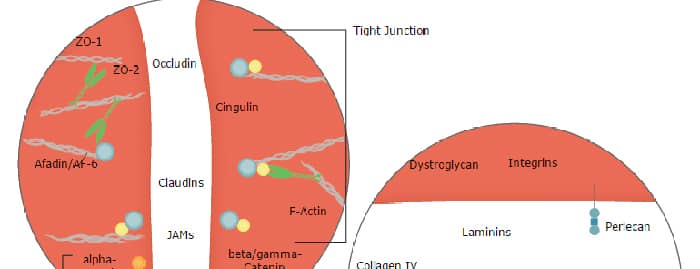Recombinant Human Fibronectin Fragment 4 Protein, CF Summary
Product Specifications
Val1913-Glu2477, with a C-terminal 6-His tag
Analysis
Product Datasheets
Carrier Free
CF stands for Carrier Free (CF). We typically add Bovine Serum Albumin (BSA) as a carrier protein to our recombinant proteins. Adding a carrier protein enhances protein stability, increases shelf-life, and allows the recombinant protein to be stored at a more dilute concentration. The carrier free version does not contain BSA.
In general, we advise purchasing the recombinant protein with BSA for use in cell or tissue culture, or as an ELISA standard. In contrast, the carrier free protein is recommended for applications, in which the presence of BSA could interfere.
3624-FN
| Formulation | Lyophilized from a 0.2 μm filtered solution in PBS. |
| Reconstitution | Reconstitute at 100 μg/mL in sterile PBS. |
| Shipping | The product is shipped at ambient temperature. Upon receipt, store it immediately at the temperature recommended below. |
| Stability & Storage: | Use a manual defrost freezer and avoid repeated freeze-thaw cycles.
|
Reconstitution Calculator
Background: Fibronectin
Fibronectin (FN) is a large modular glycoprotein that is found in a polymeric fibrillar network in the extracellular matrix (ECM). It also forms a soluble disulfide-linked dimeric protomers in plasma and other body fluids (1,2). The protein subunit is made up of three types of homologous structural motifs termed FN type I, type II, and type III repeats (3-5). Alternative splicing generates multiple isoforms of fibronectin which may have insertions of extra type III domains (EDA and EDB) or alteration of the type III connecting segment (IIICS) (5). Fibronectin is a ligand for fibrin, heparin, chondroitin sulfate, collagen/gelatin, and integrins. It is involved in multiple cellular processes including cell adhesion/migration, blood clotting, morphogenesis, tissue repair, and cell signaling. Fibronectin functions are mediated by the insoluble polymeric fibrils in the ECM. Conversion of soluble fibronectin to fibronectin fibrils in the ECM is initiated by binding to cell surface integrins, resulting in exposure of cryptic epitopes necessary for polymerization (1). FN1.4 contains one type III domain, the IIICS domain, three type I domains, and the site of interchain disulfide linkage. Within FN1.4, human fibronectin shares 91% and 88% aa sequence identity with mouse and rat fibronectin, respectively. FN1.4 contains regions that enable association with heparin and fibrin. The IIICS domain contains two sites (CS1 and CS2) that interact with integrin alpha 4 beta 1 (6-8). The CS1 sequence is not accessible in full length fibronectin but is exposed by protease digestion, thereby enabling cell adhesion via integrin alpha 4 beta 1 (9). This is distinct from integrin alpha 5 beta 1-mediated adhesion through an RGD motif located N-terminal to FN1.4 (10). Differential splicing within the IIICS domain determines the presence of CS1 and CS2 sequences and the sensitivity to proteases (6,11).
- Mao, Y. and J.E. Schwarzbauer (2005) Matrix Biol. 24:389.
- Potts, J.R. and I.D. Campbell (1996) Matrix Biol. 15:313.
- Bernard, M.P. et al. (1985) Biochemistry 24:2698.
- Kornblihtt, A.R. et al. (1983) Proc. Natl. Acad. Sci. 80:3218.
- Kornblihtt, A.R. et al. (1985) EMBO J. 4:1755.
- Mould, A.P. et al. (1991) J. Biol. Chem. 266:3579.
- Komoriya, A., et al. (1991) J. Biol. Chem. 266:15075.
- Wayner, E.A., et al. (1989) J. Cell Biol. 109:1321.
- Ugarova, T.P. et al. (1996) Biochemistry 35:10913.
- Pytela, R. et al. (1985) Cell 40:191.
- Abe, Y. et al. (2005) Biochem. Biophys. Res. Commun. 338:1640.
Citation for Recombinant Human Fibronectin Fragment 4 Protein, CF
R&D Systems personnel manually curate a database that contains references using R&D Systems products. The data collected includes not only links to publications in PubMed, but also provides information about sample types, species, and experimental conditions.
1 Citation: Showing 1 - 1
-
Dermatopontin interacts with fibronectin, promotes fibronectin fibril formation, and enhances cell adhesion.
Authors: Kato A, Okamoto O, Ishikawa K, Sumiyoshi H, Matsuo N, Yoshioka H, Nomizu M, Shimada T, Fujiwara S
J. Biol. Chem., 2011-03-11;286(17):14861-9.
Species: Human
Sample Types:
Applications: Bioassay
FAQs
No product specific FAQs exist for this product, however you may
View all Proteins and Enzyme FAQsReviews for Recombinant Human Fibronectin Fragment 4 Protein, CF
There are currently no reviews for this product. Be the first to review Recombinant Human Fibronectin Fragment 4 Protein, CF and earn rewards!
Have you used Recombinant Human Fibronectin Fragment 4 Protein, CF?
Submit a review and receive an Amazon gift card.
$25/€18/£15/$25CAN/¥75 Yuan/¥1250 Yen for a review with an image
$10/€7/£6/$10 CAD/¥70 Yuan/¥1110 Yen for a review without an image





